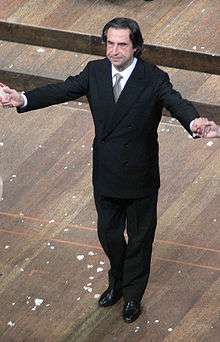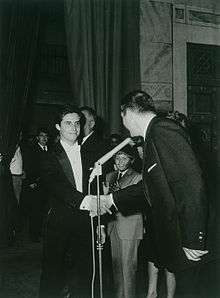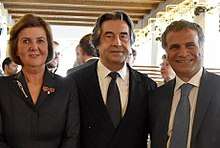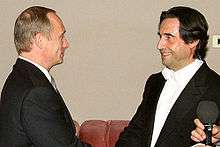Riccardo Muti
Riccardo Muti, OMRI (Italian: [rikˈkardo ˈmuːti]; born 28 July 1941) is an Italian conductor.
Riccardo Muti | |
|---|---|
 Muti in 2008 | |
| Born | 28 July 1941 |
| Alma mater | Conservatory of San Pietro a Majella Milan Conservatory |
| Years active | 1963–present |
| Spouse(s) | Cristina Mazzavillani (m. 1969) |
| Children | Chiara Domenico Francesco |
He currently holds two music directorships, at the Chicago Symphony Orchestra and at the Orchestra Giovanile Luigi Cherubini. He has previously held posts at the Maggio Musicale in Florence, the Philharmonia Orchestra in London, the Philadelphia Orchestra, the Teatro alla Scala in Milan, and the Salzburg Whitsun Festival. Muti has been a prolific recording artist, and has received dozens of honours, titles, awards and prizes. He is especially associated with the music of Giuseppe Verdi.
Childhood and education

Muti was born in Naples but he spent his early childhood in Molfetta, near Bari, in the long region of Apulia on Italy's southern Adriatic coast. His father was a pathologist in Molfetta and an amateur singer; his mother, a Neapolitan woman with five children.[1]
Muti graduated from Liceo classico (Classical Lyceum) Vittorio Emanuele II in Naples, then studied piano at the Conservatory of San Pietro a Majella under Vincenzo Vitale; here Muti was awarded a diploma cum laude. He was subsequently awarded a diploma in Composition and Conducting by the Giuseppe Verdi Conservatory, Milan, where he studied with the composer Bruno Bettinelli and the conductor Antonino Votto. He has also studied composition with Nino Rota, whom he considers a mentor. He was unanimously awarded first place by the jury of the "Guido Cantelli Competition for Conductors" in Milan in 1967 and became, the next year, principal conductor and music director of the Maggio Musicale Fiorentino, a post he held for eleven years.
Early career
Since 1971 he has been a frequent conductor of operas and concerts at the Salzburg Festival, where he is particularly known for his Mozart opera performances. From 1972 Muti regularly conducted the Philharmonia Orchestra in London and in 1973 he was appointed its principal conductor, succeeding Otto Klemperer.[2]
In 1986 Muti became principal conductor of the Filarmonica della Scala, Milan, with which in 1988 he received the Viotti d'Oro and toured Europe. In 1991, after twelve years as music director, he announced his resignation from the Philadelphia Orchestra, effective at the end of the 1991–1992 season.
In 1995 he was the president of the jury of the International Composing Competition "2 Agosto".[3]
Berlin and Vienna
Muti has been a regular guest of the Berlin Philharmonic and the Vienna Philharmonic. In 1996 he conducted the latter during Vienna Festival Week and on tour to Japan, Korea, Hong Kong and Germany; he most recently toured with the Vienna Philharmonic to Japan in 2008. Muti has also led the orchestra's globally televised Vienna New Year's Concert on several occasions: in 1993, 1997, 2000, 2004, 2018 and 2021 (scheduled).[4]
Work in opera
Apart from his work at Milan's Teatro alla Scala, where he was music director for 19 years, Muti has led operatic performances with the Philadelphia Orchestra and productions in the principal opera houses of Rome (from 1969), Ravenna, Vienna, London (from 1977), Munich (from 1979), and, finally, in 2010, New York. His work with the Vienna State Opera has included Aida in 1973, La forza del destino in 1974, Norma in 1977, Rigoletto in 1983, Così fan tutte in 1996 and 2008, Don Giovanni in 1999, and The Marriage of Figaro in 2001.
At the Salzburg Festival

A special relationship connects Muti with the Salzburg Festival, where the conductor debuted in 1971 with Donizetti's Don Pasquale (staged by Ladislav Stros). In the following years Muti has been constantly present at the festival, conducting both numerous concerts with the Vienna Philharmonic Orchestra and opera productions, such as Così fan tutte (staged by Michael Hampe) from 1982 to 1985 and from 1990 to 1991, La clemenza di Tito (staged by Peter Brenner) in 1988 and 1989, Don Giovanni (staged by Michael Hampe) in 1990 and 1991, La traviata (staged by Lluis Pasqual, and designed by Luciano Damiani) in 1995, The Magic Flute in 2005 (staged by Graham Vick) and 2006 (staged by Pierre Audi, stage designed by Karel Appel), Otello (staged by Stephen Langridge) in 2008, Moise et Pharaon (staged by Jürgen Flimm) in 2009, and Orfeo ed Euridice (staged by Dieter Dorn) in 2010. In 2011, Muti conducted a new production of Verdi's Macbeth, which was directed by Peter Stein.[5] For the 2017 Salzburg Festival, he conducted Aida, with Shirin Neshat seating on the director's chair. Muti also owns a residence close to Salzburg.
Salzburg Whitsun Festival
From 2007 to 2011, Muti was the principal conductor at Salzburg's Whitsun Festival. He conducted productions of rare Italian operas from the 18th century, and concerts with his Luigi Cherubini Youth Orchestra.

Riccardo Muti Italian Opera Academy
In July 2015, Riccardo Muti's desire to devote even more to the training of young musicians was realised: the first edition of the Riccardo Muti Italian Opera Academy for young conductors, répétiteurs and singers took place with great acclaim at Teatro Alighieri in Ravenna and talented young musicians, as well as an audience of music-lovers from around the world participated. The Academy has as purpose to pass on to young musicians Riccardo Muti's experience and lessons and to make the audience understand in its full complexity the path to accomplish an opera production.[6]
In the United States
In the United States, from 1980 to 1992 Muti was music director of the Philadelphia Orchestra, which he led on numerous international tours. In 1979, he was appointed its music director and, in 1992, conductor laureate. Muti stated that his approach was to remain faithful to the intent of the composer. This meant a change from applying the lush "Philadelphia Sound," created by his predecessors Eugene Ormandy and Leopold Stokowski, to all repertoire; however, many of his recordings with that orchestra largely seem to do away with its hallmark sound, even in the works of such composers as Tchaikovsky, Brahms, and other high romantics. His sonic changes to the orchestra remain controversial. Some felt he turned it into a generic-sounding institution with a lean sound much favored by modern recording engineers. Others believe Muti uncovered the true intention of the works, which had been covered in a silky sheen by Muti's predecessor. Since his departure from Philadelphia, he has made very few guest conducting appearances with the Philadelphia Orchestra, most recently in 2005.[7]
Muti has been a regular and popular guest conductor with the New York Philharmonic. The orchestra's musicians had reportedly been interested – towards the end of the tenures of Kurt Masur and Lorin Maazel, and before Muti took the Chicago post – in having the conductor as their music director, but Muti stated that he had no wish to take on the position.[8][9]
On 5 May 2008, Muti was named the next music director of the Chicago Symphony Orchestra (CSO), effective with the 2010–2011 season, with an initial contract of five years. Muti is to conduct a minimum of 10 weeks of CSO subscription concerts each season, in addition to domestic and international tours. He made his CSO debut at the Ravinia Festival in 1973.[10] In August 2009, Muti was said to be named the next music director of the Teatro dell'Opera di Roma, effective December 2010,[11] but the news given by the mayor (and therefore president of Opera di Roma) Gianni Alemanno was not true. Alemanno, instead, announced in October 2011 that Muti accepted an invitation by the Orchestra of Opera di Roma to become a "lifetime conductor" of Opera di Roma.[12]
End of tenure in Milan
In 2003, there were reports of artistic and programming conflicts at La Scala between musical director and principal conductor Muti and general manager Carlo Fontana.[13] Muti did not attend the press conference that announced the 2003–04 season. The appointment in 2003 of Mauro Meli as La Scala's artistic director was intended to calm the conflict between Fontana and Muti.[14]
On 24 February 2005, La Scala governors dismissed Fontana as general manager and named Meli as his successor.[15] The musicians sided with Fontana against Muti at this point in the dispute, and on 13 March, Muti stated that he would refuse to conduct the La Scala orchestra from that point on.[16] On 16 March 2005, the orchestra and staff of La Scala voted overwhelmingly against Muti in a motion of no-confidence.[17] Muti was forced to cancel a concert prior to the vote, and some other productions were disrupted at the theater because of continuing rifts with Fontana's supporters. On 2 April, he resigned from La Scala, citing "hostility" from staff members.[18][19]
Political intervention
On the night of 12 March 2011, Rome's Teatro dell'Opera staged the first in a series of scheduled performances of Verdi's opera Nabucco, conducted by Muti. After the end of the chorus "Va, pensiero", which contains the lyrics "Oh mia patria, sì bella e perduta" ("Oh my country, so beautiful and so lost"), the audience applauded "heartily." Muti, breaking with opera protocol and the strict conventions of composer Verdi himself,[20] turned to the audience and delivered a small speech, referring to the severe budget cuts announced by the Berlusconi government[21] which would particularly affect the funding of the arts. He spoke of the need to keep culture alive in Italy, prompted, as he later stated, by the belief that "killing culture in a country like Italy is a crime against society. Culture is the spiritual glue that holds a people together."[20] He then invited the audience to participate in an encore of the "Va, pensiero" chorus – the invitation and the encore also a break from tradition for an opera performance.[22] The opera audience stood up and sang along with the on-stage chorus.[23] Muti recalls that "80 percent of the audience knew the lyrics" and sang along, while "some members of the chorus were in tears."[20]
On 18 March, the performance of Nabucco was repeated in front of Italian president Giorgio Napolitano and prime minister Silvio Berlusconi. Muti, who had stated that it had been the first time in his life that he conducted chorus and audience together and also the last,[20] on that occasion conducted the Verdi opera in the "orthodox" manner.[23]
Tenure in Chicago
Muti was named conductor of the Chicago Symphony Orchestra in 2010. According to the orchestra's 2014 Form 990, he is paid a salary of $1,095,000.[24]
During the Chicago Blackhawks' run to the 2013 Stanley Cup, Muti created an orchestral version of the Blackhawks' goal song, Chelsea Dagger. In a YouTube video posted on the CSO's official channel, Muti led the CSO while wearing a customized #19 Blackhawks sweater—a tribute to Blackhawks captain Jonathan Toews, who wears #19.[25] Following the Blackhawks winning the 2015 Stanley Cup, he led the CSO in a live performance of Chelsea Dagger.[26]
Personal life
Muti is married to Maria Cristina Mazzavillani, the founder and director of the Ravenna Festival.[27] They have two sons, Domenico and Francesco, and a daughter, Chiara.[28]
In 2010, Muti wrote an autobiography. The following year, it was translated and published in English as Riccardo Muti: An Autobiography: First the Music, Then the Words. Music critic John von Rhein of the Chicago Tribune described Muti's memoir as "fascinating."[29]
Repertoire and recordings
With the Philadelphia, his recordings include the first Beethoven symphony cycle made for compact disc, the symphonies of Brahms and Scriabin, selected works of Tchaikovsky and Prokofiev, as well as less-known works of composers such as Puccini and Busoni.
Muti is considered one of the world's greatest conductors of the operas of Verdi. He also led a series of annual performances of opera in concerts including the works of Verdi, Puccini, Mozart and Wagner. In 1992, Muti conducted performances of Leoncavallo's Pagliacci with Luciano Pavarotti. A recording was also made of these performances.
At La Scala, Muti was noted for exploring lesser-known works of the Classical- and early Romantic-era repertory such as Lodoiska by Cherubini and La vestale by Spontini.
Honours
- Muti received several honours from the Italian government: in 1980, he was appointed a Grand Officer of the Order of Merit of the Italian Republic and was promoted to a Knight Grand Cross of the same Order in 1990. He was awarded a Golden Medal of the Italian Order of Merit for Culture and Art in 1997.[30]
- Muti is an Honorary Member of the Royal Academy of Music (Hon RAM) since 1981.[31]
- Honorary degree, University of Pavia, 1996.
- Muti was made an honorary Knight Commander of the Order of the British Empire (KBE) in 2000.[32]
- Muti was awarded a doctorate honoris causa by the Universitat de Barcelona on 13 October 2003.
- On 4 June 2010, Muti was appointed a Commander of the Legion of Honour by then French First Lady Carla Bruni-Sarkozy.[33]
- In 2011, Muti was made a Member of Russia's Order of Friendship.[34]
- In 2013, Muti was named Honorary President of EMMA for Peace, a network of music institutions.[35]
- On 20 June 2014, Muti received an honorary degree from Northwestern University in Evanston.[36]
- On 3 July 2016, Muti was awarded the 2nd Class, Gold and Silver Star of Japan's Order of the Rising Sun.[37]
- On 1 July 2018, Muti was awarded the 3rd Class, Order of Merit (Ukraine).[38]
Awards
- 2010 Grammy Awards (2) for Best Classical Album and Best Choral Performance for Verdi: Requiem [39]
- 2011 Birgit Nilsson Prize[40]
- 2011 Prince of Asturias Award for the Arts.
- 2018 Praemium Imperiale[41]
References
- "Muti, la mia infanzia a Molfetta quando in regalo ebbi un violino". www.lagazzettadelmezzogiorno.it.
- Stephen Moss (31 January 2005). "Enough!". The Guardian. Retrieved 2007-06-03.
- "About Us".
- "Vienna Philharmonic Orchestra". www.wienerphilharmoniker.at. Retrieved 2020-01-01.
- "Muti : Bring music to prisons" Archived 2012-03-01 at the Wayback Machine La Stampa, 5 August 2010 (in Italian).
- "Biography".
- Bernard Holland (15 February 2005). "Muti Returns to Philadelphia for a Reunion". The New York Times. Retrieved 2007-06-03.
- Ed Vulliamy (24 December 2000). "How America dropped the baton". The Observer. Retrieved 2007-07-15.
- Daniel J. Wakin (25 April 2007). "Philharmonic to Add a Position at the Top". The New York Times. Retrieved 2007-07-15.
- "Riccardo Muti to be CSO music director". The Associated Press. 5 May 2008. Archived from the original on 7 May 2008. Retrieved 2008-05-05.
- Leandro Palestini (2009-08-20). "Riccardo Muti andrà all' Opera di Roma". La Repubblica. Retrieved 2009-08-22.
- "Muti all'Opera di Roma 'a vita'" (in Italian). Il giornale della musica. Retrieved 2011-10-12.
- John Hooper (16 September 2003). "Dumbing down row at La Scala". The Guardian. Retrieved 2007-07-15.
- Philip Willan (13 October 2003). "New aria of peace at La Scala". The Guardian. Retrieved 2007-07-15.
- John Hooper (3 March 2005). "Recriminations fly as crisis engulfs La Scala". The Guardian. Retrieved 2007-07-15.
- John Hooper (14 March 2005). "Conductor downs baton at La Scala". The Guardian. Retrieved 2007-07-15.
- John Hooper (17 March 2005). "Staff demand Muti exit in latest La Scala drama". The Guardian. Retrieved 2007-07-15.
- Vanessa Thorpe (3 April 2005). "Muti exits after a musical mutiny". The Observer. Retrieved 2007-07-15.
- Laura Smith (4 April 2005). "Curtain falls on unhappy Muti at La Scala". The Guardian. Retrieved 2007-07-15.
- 'Muti : Killing Culture is a Crime" Corriere della Sera, 15.
- "Italy Passes $68 Billion in Budget Cuts" Bloomberg, 1 July 2011.
- "Va, pensiero" on YouTube Theatro dell'Opera, Rome, Saturday 12 March 2011.
- "Muti conducts 'Nabucco' with Napolitano and Berlusconi present" Quotidiano, 18 March 2011.
- http://www.guidestar.org/FinDocuments/2014/362/167/2014-362167823-0b7da1c8-9.pdf
- CSO Salutes the Blackhawks in 2013 with Chelsea Dagger Goal Song on YouTube
- Live performance of Chelsea Dagger by CSO on YouTube
- "Muti Mazzavillani, lady of the Ravenna Festival: "That's how I made the city grow", FQ Emilia Romana website, 9 June 2011 (in Italian).
- "Chiara Muti Swans in Fendi for La Scala's Swan Lake". Opera Chic. July 25, 2013. Retrieved December 1, 2019.
- von Rhein, John (July 27, 2011). "Muti book a compelling saga of a rich life lived in music". Chicago Tribune. Retrieved June 9, 2016.
- Riccardo Muti's List of Honors from Italy's Presidential website.
- "Honorary Members (Hon RAM)" (PDF). Royal Academy of Music. Retrieved 17 October 2015.
- List of Knighthoods awarded 1997-2006 Archived October 1, 2012, at the Wayback Machine, UK Parliament website.
- Cérémonie de décoration de Riccardo Muti Archived March 17, 2012, at the Wayback Machine, 2010.
- Sweeting, Adam (16 March 2011). "Riccardo Muti: a profile". The Telegraph. Retrieved 23 April 2011.
- Bugeja, Michael (October 20, 2013). "Ruben Zahra in Euro academy for peace". Times of Malta. Retrieved Nov 4, 2019.
- "World-Renowned Conductor to Address Class of 2014: Northwestern University News". www.northwestern.edu. Retrieved 2016-05-23.
- "Concert The Roads of Frienship Ravenna-Tokyo". Archived from the original on 2016-08-20.
- Президент: Саме такі фестивалі як «Шляхи дружби» - це культурний зв’язок і свідчення повернення України до Європи. www.president.gov.ua (in Ukrainian). Retrieved 2018-07-01.
- "53rd Annual GRAMMY Awards". GRAMMY.com. November 28, 2017.
- "The Birgit Nilsson Prize 2011 recipient". Archived from the original on 25 July 2011. Retrieved 16 March 2011.
- "Riccardo Muti receives Praemium Imperiale Award". Gramophone. London. 11 July 2018. Retrieved 17 July 2018.
External links
| Wikimedia Commons has media related to Riccardo Muti. |
- Riccardo Muti Official website
- Riccardo Muti at the Encyclopædia Britannica
- Riccardo Muti at AllMusic
- Riccardo Muti on IMDb
- Riccardo Muti biography at Sony BMG Masterworks
| Cultural offices | ||
|---|---|---|
| Preceded by Claudio Abbado |
Music Director of La Scala 1986–2005 |
Succeeded by Daniel Barenboim |
| Preceded by Daniel Barenboim |
Music Director of the Chicago Symphony Orchestra 2010-present |
Succeeded by incumbent |
